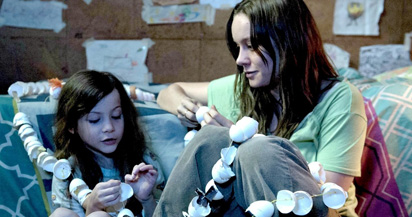The 400-Word Review: Room
By Sean Collier
November 16, 2015
BoxOfficeProphets.com

The screenplay, which author Emma Donoghue adapted from her own novel, seeks to explore what a million thrillers, dramas and horror films have ignored: What happens after the hero triumphs? To be fair, it’s a question that has been explored elsewhere, but never so eloquently — or brutally.
Joy Newsome (Brie Larson) was taken captive at 17 by a man she refers to as Old Nick (Sean Bridgers). Seven years have passed when Room begins; during that time, Joy has lived in a garden shed as Old Nick’s captive and sex slave. She shares the space with her son, Jack (Jacob Tremblay), who was born in the room and has never been outside.
To spare him, Joy has told Jack that there’s nothing outside of their home but outer space; since their only window is a small skylight, he’s gone along with it. Now, however, Joy believes that Jack is old enough to aid her in a desperate escape attempt.
Spoilers follow, though they should be familiar to anyone with passing familiarity with the film or book: Joy and Jack do manage to escape. In most tales, the story would end there; in Room, that false climax occurs about halfway through the film. Donoghue (and director Lenny Abrahamson) are more concerned with how mother and child re-enter a world she has forgotten and he has never known.
It is as heart-wrenching as it is fascinating; we are accustomed to seeing our protagonists triumph and walk offscreen into blissful satisfaction, regardless of the atrocities they’ve witnessed (and/or committed). Joy’s inability to return to the world isn’t just a powerful statement on storytelling, it’s a challenging exploration of human psychology.
Donoghue’s adaptation is wistful and delicate; allowing the writer to handle her own story was essential. Abrahamson’s work captures the singular, peculiar tone of Donoghue’s script; the direction is subtle but inspired, particularly when contrasting the shots inside the shed with those in the world outside.
And, at last, Brie Larson may finally be recognized as the incredible talent that she is. Previously relegated to stealing films in supporting roles and leading underappreciated gems (such as Short Term 12), she delivers what is unquestionably the performance of the year in Room. This is the rare case where a brilliant performer and an excellent film align perfectly.
My Rating: 10/10
Sean Collier is the Associate Editor of Pittsburgh Magazine and a member of the Broadcast Film Critics Association. Read more from Sean at pittsburghmagazine.com/afterdark